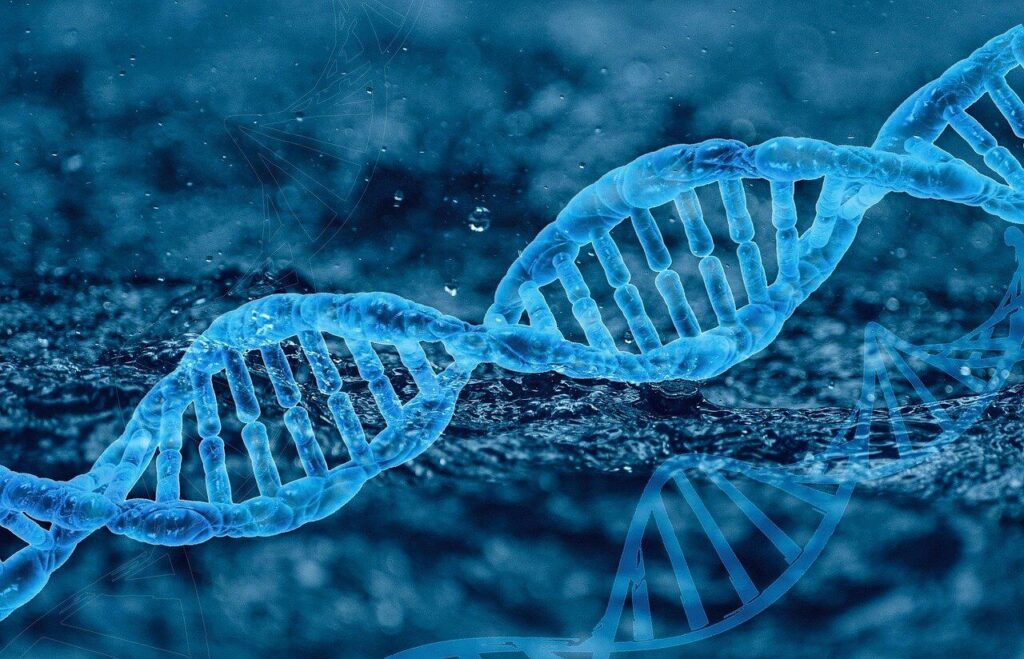When you hear the word mutation, what comes to mind? Something out of an X-Men movie? Well, I hate to disappoint you, but the truth is far less dramatic. Nearly everyone carries some type of genetic mutation (1).
One of them is the MTHFR gene mutation, which affects roughly 40% of Americans (2). This gene plays a role in how your body processes nutrients and eliminates toxins. While MTHFR mutations are common, they can increase the risk of many health conditions. This includes nutrient deficiencies, mental health disorders, high blood pressure, and even some cancers.
The good news? There are natural ways to support your body if you have an MTHFR mutation. So, if you know or suspect you have one, read on. We’ll cover what the MTHFR gene mutation is, how genetic testing can detect it, and simple tips to help your body thrive.
What is an MTHFR Gene Mutation?
MTHFR stands for methylenetetrahydrofolate reductase—quite a mouthful, so we’ll stick to the acronym! An MTHFR gene mutation is just what it sounds like: a variation in the MTHFR gene.

This gene tells your body how to make the MTHFR enzyme, which helps your body process folate, a B vitamin you need to form DNA. The MTHFR enzyme helps convert folate into methyl-folate, the active form your body uses (3).
When folate gets low, methylation suffers. Methylation is a process that affects gene expression, detoxification, neurotransmitter production, and more. So when it’s hindered, a lot can go wrong.
The MTHFR enzyme also helps break down amino acids like homocysteine. When this process doesn’t work properly, homocysteine levels can rise. This can increase the risk of certain health issues, like cardiovascular conditions.
MTHFR gene mutations can make it harder for the MTHFR enzyme to do its job. This can affect how your body processes nutrients and removes toxins.
Types of MTHFR Gene Mutations
Everyone has two copies of the MTHFR gene—one from their mother and one from their father. And you can inherit a gene mutation from either one.
The most common types of MTHFR gene variants are:
- C677T
- A1298C
It’s possible to inherit one of these variants (heterozygous) or both (homozygous). Some people carry two copies of the same variant. Others have none at all.
As a rule, the more variants you carry, the more it can affect your health. This is especially true if you have two copies of C677T or one of each variant. Both can lead to high homocysteine levels, which can be harmful to your body.
MTHFR Gene Mutation Symptoms
MTHFR mutations impact each person differently. Some people may experience symptoms, and others may notice nothing at all.
That being said, evidence shows MTHFR mutations can increase the risk of a slew of health conditions, including:
- Depression (4)
- Anxiety (5)
- Bipolar disorder (4)
- Schizophrenia (4)
- High blood pressure (6)
- Cardiovascular disease (7)
- Alopecia areata (3)
- Spina bifida (3)
- Neuropathy (8)
- Homocystinuria (3)
- Chronic pain (9)
- Autism spectrum disorder (10)
- ADHD (11)
- Liver conditions (12)
- Autoimmune disease (13)
- Polycystic ovary syndrome (PCOS) (14)
- Certain forms of cancer (15)
Remember, an MTHFR mutation doesn’t guarantee you’ll have symptoms or health issues. It depends on which variant you have and whether both copies of your MTHFR genes are affected.
If you do have an MTHFR mutation, here’s the good news: diet and lifestyle are powerful medicine. With a few simple tweaks, you can help reduce symptoms, enhance methylation, and support your overall health.
Natural Ways to Manage MTHFR Mutations
Here are a few lifestyle changes that our Illinois clinic recommends that may be beneficial for MTHFR gene mutations:
Bump up folate
Folate deficiencies are common with MTHFR mutations (16). Because of this, it’s a good idea to consume more folate-rich foods.
Some of the best sources of dietary folate include:

- Leafy greens like spinach & kale
- Avocados
- Broccoli
- Lentils
- Asparagus
- Edamame
- Lettuce
- Mangos
- Oranges
Supplements can also help fill in the gaps. Just be sure to choose the methylated form, methylfolate. It’s the most bioavailable and easiest for your body to absorb.
Address other nutritional deficiencies
Folate isn’t the only nutrient that needs a look. People with MTHFR mutations are often low in vitamin B12, too. Try eating more foods rich in vitamin B12. It’s abundant in many animal foods like clams, mussels, beef, tuna, and sardines.
Plant sources are harder to come by, but nutritional yeast and seaweed are two options. Or consider a supplement with a combo of methylfolate and methylcobalamin—the methylated form of vitamin B12.
Nutrients like vitamin B6, magnesium, and choline are also important, as low levels are linked with high levels of homocysteine. Adding more foods rich in these nutrients to your diet may help keep homocysteine in check:
- Foods high in vitamin B6: salmon, chicken, pork, sweet potatoes, potatoes, pistachios, avocados
- Foods high in magnesium: pumpkin seeds, dark chocolate, avocados, almonds, black beans
- Foods high in choline: eggs, shrimp, salmon, pork, broccoli, green peas, beans
If you’re curious about your nutrient status and live in the Chicago area, Anchored in Health is here to help. Our clinic offers Vibrant Wellness testing to assess your levels of micronutrients.
Manage stress

MTHFR mutations can make people more susceptible to stress and neurotransmitter imbalances. That’s why stress management is a must for MTHFR variants.
Try to practice relaxation techniques regularly to help balance your nervous system. Even 5-10 minutes of meditation, deep breathing, yoga, or vagus nerve exercises can make a difference. Getting out in nature, journaling, and connecting with loved ones can also help you de-stress.
Exercise is also a potent mood elevator and stress-buster. Aim to move your body at least 150 minutes each week—or roughly 20 minutes per day. Your mood and stress levels will thank you.
Keep toxins in check
Limiting toxin exposure is a good idea for everyone, but it’s especially important if you have an MTHFR variant. That’s because detox can be sluggish for folks with MTHFR gene mutations. Research shows that people with two copies of the C677T variant tend to have a harder time eliminating toxins (17).
Switching to natural skincare and personal care products is a simple way to reduce your toxic load. Check out EWG’s Skin Deep database for loads of clean, non-toxic options. Opt for natural house cleaners, too, like vinegar or clean brands like Branch Basics. Using an air purifier and water filter can also help reduce toxin exposure.

Support detox
Since methylation issues can weaken detox, your body may need some extra support in this area. Luckily, there are many natural ways to enhance detoxification.
An easy place to start is to eat more detox-friendly foods like cruciferous veggies, leafy greens, and citrus fruits. Or consider adding some detox practices into your routine, like dry brushing, castor oil packs, or Epsom salt baths. Staying well-hydrated should also be a top priority, as it helps your body excrete toxins in your pee and poop.
What Foods Should You Avoid with MTHFR Mutations?
If you have an MTHFR mutation, not all foods may be the best fit for your body. Here are a few potential troublemakers recognized by functional medicine doctors:
Foods fortified with folic acid
Folic acid is the synthetic form of folate. It’s used to enrich many processed foods like cereals, pasta, bread, and instant rice. It’s harder for people with MTHFR mutations to convert folic acid into folate. Consequently, this can cause folic acid to build up in the body.
For this reason, it’s best not to overdo it on folic acid-enriched foods. Most are highly processed anyway, so you’re better off without them! The same goes for supplement formulas with folic acid. Opt for methylfolate instead.
Alcohol
Don’t mean to be a party pooper here—but drinking alcohol is hard on your liver and can impair methylation. And since MTHFR mutations can weaken methylation, limiting alcohol may be a wise move.
Inflammatory foods
Research shows that people with the C677T mutation are more prone to systemic inflammation (18). And one of the biggest sources of chronic inflammation is diet. That’s why it’s best to steer clear of inflammatory foods.
Try limiting your intake of inflammatory foods like:
- Sugar
- Ultra-processed foods (cereal, chips, cookies, etc.)
- Refined carbs (e.g., white bread, pasta, white rice)
- Fried foods
- Fast food
- Seed oils
- Processed meats
- Red meat
- Gluten
How to Test for MTHFR Mutations in Illinois
If you suspect you could have an MTHFR mutation, a few tests can provide clarity. One inexpensive option is to take an MTHFR gene mutation test. As the name suggests, this only tests for MTHFR gene variants.
Genetic testing is another option. Genetic testing offers a comprehensive look at your genes, including MTHFR mutations. That way, treatment can be customized for your unique genetic blueprint. Genetic testing is especially helpful if you’re dealing with mysterious symptoms and can’t seem to find the root cause.
You can also ask your doctor to test your homocysteine levels. If your results are high, an MTHFR test may be a good next step.
Take Control of Your Health with Genetic Testing in Orland Park, IL
Genes are important, but they don’t define your health—your lifestyle does. If you have an MTHFR mutation, the diet and lifestyle tips we shared can help support methylation, optimize detox, and keep symptoms in check.
Suspect you have an MTHFR mutation? Testing can help you get answers.
At Anchored in Health, we offer comprehensive genetic testing to help you understand your unique blueprint. From there, our holistic doctor creates a personalized wellness roadmap based on your results.
If you’re in the Chicago area and want to get real answers, follow these steps:
- Contact us with questions.
- Schedule your genetic testing consultation with our functional medicine doctor.
- Experience how genetic testing can help you feel your best!
Other Holistic Health Services at Anchored in Health in Orland Park, IL
At Anchored in Health, we do more than genetic testing. We offer a wide range of services to enhance your health and well-being. This includes chiropractic care, acupuncture, massage therapy, and the Shape ReClaimed program. We also provide functional medicine, thermography, and vibrant wellness testing to find the root cause of your symptoms.
Contact us to find out how we can support you on your health journey!
Disclaimer: The information provided on this blog is for educational and informational purposes only and is not intended to diagnose, treat, cure, or prevent any disease. The content is not a substitute for professional medical advice, diagnosis, or treatment. Always seek the guidance of a qualified healthcare provider with any questions you may have regarding your health or a medical condition.
Reading this blog does not establish a doctor-patient relationship between you and Anchored In Health or any of its practitioners. Reliance on any information provided in this blog is solely at your own risk. For medical concerns, always consult a licensed healthcare provider.
Sources:
- Study Finds Genetic Mutations in Healthy Human Tissues | NIH
- MTHFR Gene Polymorphisms Prevalence and Cardiovascular Risk Factors Involved in Cardioembolic Stroke Type and Severity | Pubmed
- MTHFR Gene | Medline Plus
- Methylenetetrahydrofolate reductase and psychiatric diseases | Pubmed
- Contribution of the MTHFR gene to the causal pathway for depression, anxiety and cognitive impairment in later life | Pubmed
- Impact of the MTHFR C677T polymorphism on blood pressure and related central haemodynamic parameters in healthy adults | Pubmed
- Methylenetetrahydrofolate (MTHFR), the One-Carbon Cycle, and Cardiovascular Risks | Pubmed
- Association of MTHFR gene C677T mutation with diabetic peripheral neuropathy and diabetic retinopathy | Pubmed
- MTHFR mutation: Another unifying etiology of chronic overlapping pain conditions | Science Direct
- Association between MTHFR C677T/A1298C and susceptibility to autism spectrum disorders: a meta-analysis | Pubmed
- Association between MTHFR (677C>T and 1298A>C) polymorphisms and psychiatric disorder: A meta-analysis | Pubmed
- MTHFR 677C/T and 1298A/C mutations and non-alcoholic fatty liver disease | Pubmed
- Association between Genetic Polymorphisms in Methylenetetrahydrofolate Reductase and Risk of Autoimmune Diseases: A Systematic Review and Meta-Analysis | Pubmed
- Significant association between methylenetetrahydrofolate reductase gene C677T polymorphism with polycystic ovary syndrome risk | Pubmed
- MTHFR C677T and postmenopausal breast cancer risk by intakes of one-carbon metabolism nutrients: a nested case-control study | BMC
- Serum Folate and Methylenetetrahydrofolate Reductase (MTHFR) C677T Polymorphism Adjusted for Folate Intake | Pubmed
- More severe toxicity of genetic polymorphisms on MTHFR activity in osteosarcoma patients treated with high-dose methotrexate | Pubmed
- Opposite impact of Methylene tetrahydrofolate reductase C677T and Methylene tetrahydrofolate reductase A1298C gene polymorphisms on systemic inflammation | Pubmed
